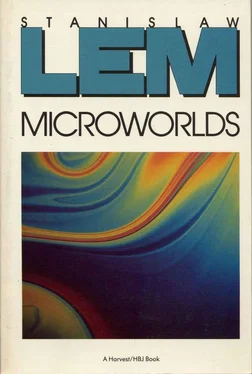I shall add the autobiographical element in my discursive writings to this enumeration. In brief, I am a disenchanted reformer of the world. My first novels concerned naïve Utopias, because in them I was expressing a desire for a world as peaceful as that described in them, and they are bad, in the sense in which a vain and erroneous expectation is stupid. My monograph on science fiction and futurology is an expression of my disappointment with a fiction and a nonfiction that pretend to be scientific, when neither of them turns the attention of the reader in the direction in which the world is in fact moving. My Philosophy of Chance is a failed attempt to arrive at a theory of the literary work based on empiricism; it is successful inasmuch as I taught myself with the help of this book what factors cause the rise and the decline in the fortunes of literary works. My Summa Technologiae, on the other hand, is proof of the fact that I am not yet a despairing reformer of the world. For I do not believe that mankind is for all times a hopeless and incurable case.
This essay is a rewritten chapter (“Sociology of Science Fiction”) from my Fantastyka i futurologia ( Science Fiction and Futurology ). I have polemically sharpened the original text in several instances, and added the later review of Dick’s work, which is absent from the book. I confess that I made a blunder when I wrote this monograph, since then I knew only Dick’s short stories and his Do Androids Dream of Electric Sheep? I believed that I could rely on reviews published in the fanzines of other novels by Dick, with the result that I considered him merely a “better van Vogt,” which he is not. This mistake was due to the state of science-fiction criticism. Every fifth or eighth book is praised as “the best work of science fiction in the whole world,” its author is presented as “the greatest science-fiction author ever,” great differences between works are minimized and annulled, so much so that in the end Ubik may be regarded as a novel that is just a little better than Do Androids Dream of Electric Sheep? Naturally, what I say does not justify my mistake, because no criticism is a substitute for reading the books concerned. However, my words still describe the circumstances responsible for causing my error, because it is a physical impossibility to read every science-fiction title, so that there must be a selection; as you can see, one cannot rely on science-fiction criticism to make this selection.
It is quite difficult to shake off either a bad or a good tradition, once it is established. In The Issue at Hand, James Blish complains that English criticism surpasses American, and that this difference of level can be seen also on another plane — according to Blish, English publishers treat science-fiction authors with a consideration scarcely to be found in United States. His words date from the fifties. From what I know of the state of things today, this difference has decreased insofar as American criticism has improved, insignificantly, and English publishers have become a bit less considerate.
This does not mean that the radius of effective action of a statement varies directly with the range of a medium — i.e., in our case, that this radius grows in proportion to the increase of circulation of the periodical in which this statement is printed. In regard to circulation, many highbrow literary periodicals are no better off than the high-circulation fanzines, and the literary and theoretical publications of university faculties sometimes have tiny circulations, as low as three hundred or four hundred copies. What I am saying is that the degree of attention paid by the public to a “message” (a normative judgment) is determined by quite different factors from those of circulation. So, in some countries, an extreme degree of public opinion is paid to several “underground” papers, though these pamphlets look shabby and are circulated in very tiny editions. The authority, the weight, of such statements belongs to the imponderabilities of civilization; the public must be aware in advance that somebody important has something to say; but the “inherently wise,” or even the “eggheads,” do not possess such authority and attraction in their own right. The channels that serve to disseminate information are not built by technical and material means (such as the number of copies of a periodical distributed). Instead, these copies find their own way and have their maximum effect only if they flow into a broader structure that strengthens the message. This is the case for the highbrow periodicals because they live at the peak of the cultural pyramid. It is an extremely important phenomenon, which has been almost neglected. In many circles of fandom, people believe that one could wake the “silent majority” of the public from its slumber if only one could bomb the public incessantly with beautifully made publications with mass circulations. Most probably the public would throw these fine pamphlets into the nearest wastepaper basket because this bombardment of mass-produced science fiction would still lack the necessary influence. Authority and influence are not acquired easily.
This applies only to the novels by Dick that I know: Solar Lottery , The Three Stigmata of Palmer Eldritch , Our Friends from Frolix 8 , Now Wait for Last Year , Do Androids Dream of Electric Sheep? , Ubik , and Galactic Pot-Healer . In addition, I have read several of Dick’s short stories, mainly in science-fiction magazines.
Each society is stratified according to its own pattern. In each society there are powers of selection with local effects to attract and repel individuals. Among others, such mass processes give rise to different readerships for widely differing varieties of literature. If one compared the intelligence and level of education of the average science-fiction reader in the United States and in the Soviet Union, one would draw the conclusion that the Russians know more about literature and are more intelligent than the Americans. However, this would be a fallacy; the selection processes of science-fiction readership in Russia and in the United States have taken different courses, because of the different traditions that prevail in the two countries in regard to the broader questions of the duties and psychosociological status that literature, as a whole, must play in society. Certainly the United States has the same percentage of bright boys and girls as Russia has but intelligent readers there approach science fiction far less often than they do in Russia.
A lack of theoretical essays on science fiction was the reason for my career as a Robinson Crusoe; like the unhappy man on a desert island, I had to sweat for years, under the most primitive conditions, to produce the necessary (intellectual) tools by myself. My tactic concerning trash was to ridicule it — i.e., to blow up its model until its nonsense, multiplied many times, became ludicrous. But this is the simplest of tactics. On my own I thought there was no better way than to avoid trash and to remove all traces of it from my work.
The dates given in this essay are either for first publication, whether in serial or book form, or for serial/book publication. — R. D. Mullen.
Slonimski, born in 1895, was a Polish poet and essayist.
Bertaux is a Germanist, and he published the article quoted, “Innovation als Prinzip,” in German in the volume Das 798. Jahrzehnt (Christian Wegner Verlag, 1969). — SL. The passage given in German in Dr. Lem’s original text (from which the first sentence has been reduced to the bracketed phrase in our translation) reads as follows: “Unter ‘Diagonalwissenschaften’ (um den Ausdruck von Roger Caillos aufzunehmen) verstehe ich ungefähr das, was man auch ‘formalistische’ Wissenschaften nennt, also Disziplinen, deren Gebiet sich quer durch die herkömmlichen Fächer der Realwissenschaften zieht… Eine Zeitlang hat man hoffen können, der Ansatz zu einer ähnlichen Formalisierung der Humanwissenschaften sei vom Strukturalismus zu erwarten. Leider sieht es heute aus, als ob gerade die lautesten Vertreter des Strukturalismus ihn zu einer Mythologie hätten entarten lassen — und nicht einmal zu einer brauchbaren. Das Gerede, das jetzt den Namen Strukturalismus tragt, hat den ursprünglich in ihm enthaltenen wissenschaftlichen Ansatz wahrscheinlich tödlich getroffen.” — Charles Nicol, R. D. Mullen, Darko Suvin.
Читать дальше












